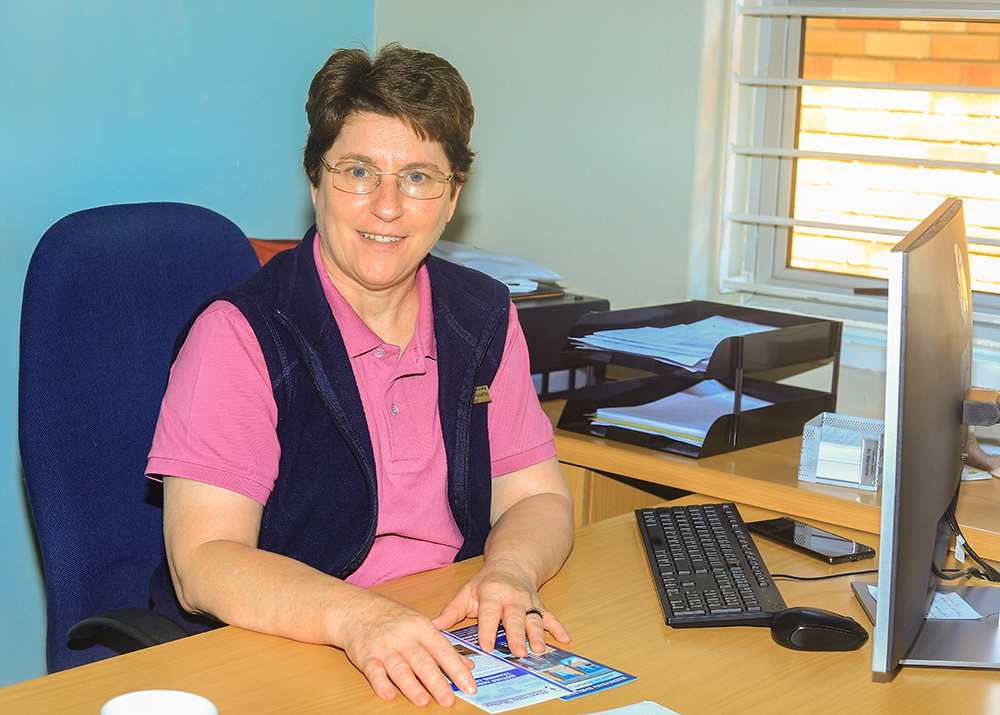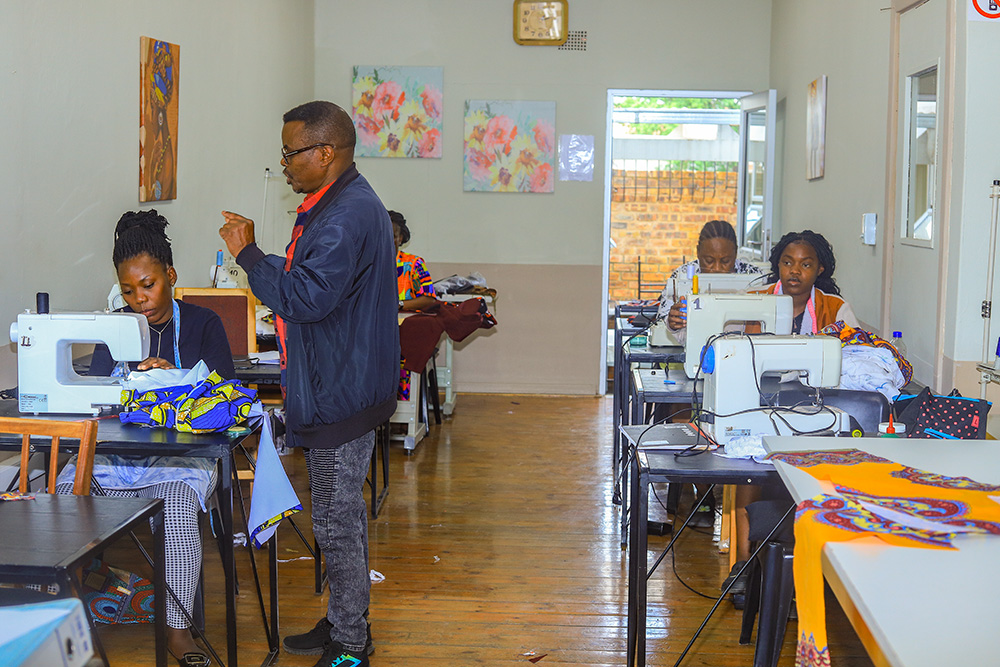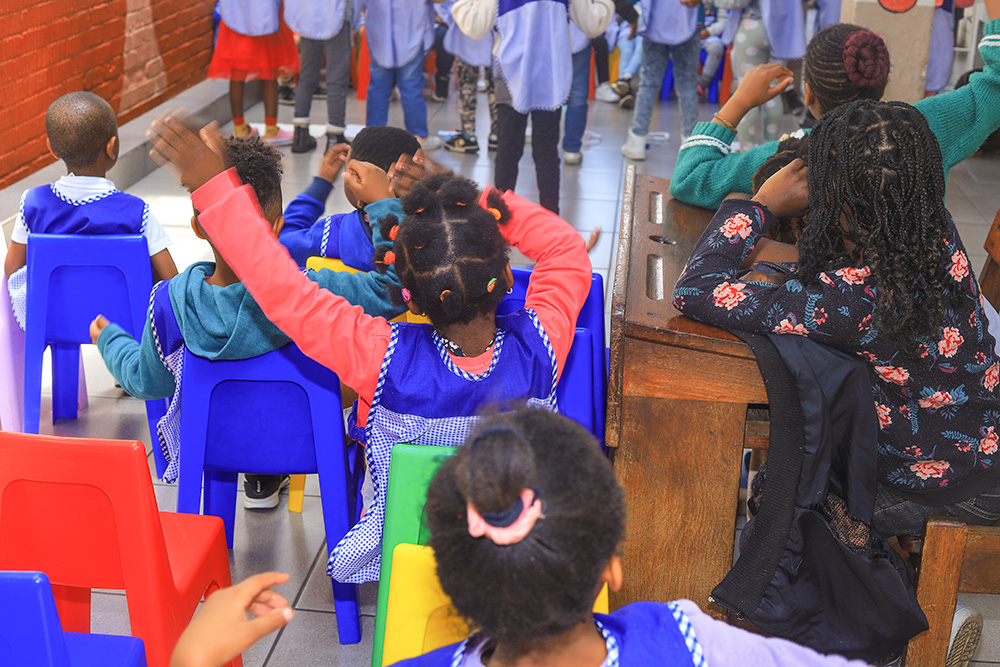
Sr. Marivane Chiesa, a member of the Scalabrinian Sisters, has served as the director of the Bienvenu Shelter for seven years. Established in 2001 in a suburb of Johannesburg, South Africa, the shelter provides a refuge for women and child refugees. (GSR photo/Doreen Ajiambo)
In the heart of the bustling city of Johannesburg, Sr. Marivane Chiesa serves as a pillar of strength and hope for women and their children who are seeking refuge from the challenges of displacement throughout Africa, especially in South Africa. As the director of the Bienvenu Shelter, a safe haven for migrant and refugee women, Chiesa dedicates her life to helping these women rebuild their lives.
The shelter, which accommodates approximately 45 women, offers temporary housing as well as essential support for women and migrant refugees. Under Chiesa's leadership, it has transformed into a safe space where women not only find refuge but also gain access to resources that lead them toward self-sufficiency.
Approximately 250,000 refugees and asylum seekers reside in South Africa, which has a total population of 60 million. In South Africa, refugees and asylum seekers are entitled to legal rights similar to those of citizens. However, many of them face challenges in exercising these rights.
Widespread xenophobia and gender-based violence severely impact these communities, both internally and externally.
"We provide these women with a home, a safe place where they can feel secure. More importantly, we offer them hope and the skills they need to start their lives anew," said Chiesa, a member of the Scalabrinian Sisters who has been the director of the Bienvenu Shelter for seven years.
Women at the shelter receive skills training to help them become independent and find sustainable employment. Tailoring, cooking, baking and small business workshops are just a few programs that equip them with practical skills for a brighter future.
"It's about giving them dignity and the tools to stand on their own feet," said the Brazilian-born nun.

Women refugees take part in a tailoring class at the Bienvenu Shelter in Johannesburg, South Africa, on Oct. 16, 2024. The women at the shelter receive skills training to help them achieve independence and find sustainable employment. (GSR photo/Doreen Ajiambo)
Chiesa mentioned that children play a vital role in the shelter's compassionate care. "Currently, we proudly support 80 children in our crèche and preschool, ensuring they thrive while their mothers build a brighter future," she said.
"The preschool and day care program offers a safe and nurturing environment for children until they reach 6 years old," she said. "We understand that mothers need to focus on their own development without having to worry about their children's safety and well-being."
Chiesa's work is motivated by her strong faith and dedication to social justice. "These women have escaped violence, poverty and instability. Our mission is to ensure they not only survive but also achieve peace, stability and the opportunity for a new beginning," she said.
Chiesa's tireless efforts have yielded results, as she mentioned that her team at the shelter has positively impacted the lives of countless women and children. She emphasized that the shelter offers more than just a roof over their heads; it provides hope, resilience and the promise of a better future.
GSR: What qualifications must a refugee meet to be admitted to the Bienvenu Shelter?
Chiesa: The primary qualification for admission is that the individual must be a new arrival. We prioritize mothers who are new to the country, as many are not familiar with the local language and face challenges in navigating their new environment. These mothers need support to begin building relationships within the community until they can fully integrate.
Our main focus is on new arrivals, migrants and refugees from various parts of Africa. We also assist some South Africans, particularly those from rural areas of Johannesburg, who are seeking job opportunities. Many of these individuals arrive in the city with hopes of finding success to support their families, but often their dreams are shattered, leaving them in difficult situations.
We collaborate closely with local organizations, including the police, who refer these individuals to us for assistance.
What is the first step you take when refugees arrive at your shelter?
When a woman arrives at our shelter, we first assess her to ensure she is in a sound state of mind. Upon arrival, we provide her with toiletries, a bed and food. She is also given time to rest in silence, allowing her to process her thoughts and emotions. The first day is dedicated to resting, eating, sleeping, crying and reflecting quietly.
Advertisement
On the second day, we conduct an initial assessment to hear her story and understand what brought her to South Africa and our shelter. This includes exploring her feelings, challenges, circumstances and the status of her family. A social worker facilitates this process.
The woman is permitted to stay for three days while we verify her information, but she is not formally admitted yet. Once we confirm her details, we can proceed with her admission. After admission, we give her time to familiarize herself with the shelter's rules, meet other residents and get to know the staff to help her feel more at home.
We have never had to turn anyone away; all arriving women are typically admitted. If a mother arrives with a child, we place the child in our crèche, which includes a baby room and a preschool. For mothers, we assist with resolving any documentation issues.
We ensure she visits the Ministry of Home Affairs to obtain her status as a refugee, migrant or asylum seeker. Additionally, we offer English and Zulu language classes, as Zulu is the most commonly spoken language in South Africa. This is crucial for the mother's successful reintegration into the community.
What is the duration of stay for refugee or migrant women at the Bienvenu Shelter, and what is the exit strategy for them and their children?
We provide accommodation for mothers and their children for a maximum of three months. This period is intended to be temporary, but if necessary, we can extend it to six or even nine months based on the mother's psychological needs. In addition to housing, we assist women in dealing with trauma and offer medical checkups.
After three months, we collaborate with the mother to create a strategic exit plan. This plan outlines when she will leave, where she will stay afterward, how she will support herself, and how she will manage her new life. Together, we establish a timeline and a concrete exit strategy, ensuring that when it's time for her to leave, she does so feeling prepared, happy and hopeful. Most women arrive in distress, but we strive to ensure they depart with joy.
We also provide transportation to their new homes to ensure a smooth transition. In some cases, we cover rent for one, two or even three months.

Children of women refugees play at the Bienvenu Shelter in Johannesburg, South Africa, on Oct. 16, 2024. The shelter provides a safe haven for migrant and refugee women and also offers education to their children. (GSR photo/Doreen Ajiambo)
We maintain contact with the women and include them in our outreach program, so leaving the shelter does not sever our support. We continue to check in on them, and they can visit us weekly for food supplies. We receive food donations from generous community members, which we distribute to the women. Each morning, we collect bread from various bakeries throughout the city. The amount of food we provide each week depends on the donations we receive.
Furthermore, even if a mother leaves the shelter, her child remains in our day care until we are confident they can manage independently.
Occasionally, women may need to be readmitted for additional support. In this shelter, we foster a strong, familial relationship with the women and their children.
What challenges do you face at the shelter while performing your duties?
The biggest challenge we face is how the government manages the documentation of asylum seekers, migrants and refugees. The lengthy process for issuing documents makes it increasingly difficult for us to provide the necessary assistance to these individuals.
Additionally, the government is shutting down numerous shelters across the country, particularly those that support people with mental health issues. As a result, we often find ourselves without appropriate places to refer women in need of mental health evaluations. While we do collaborate with counseling centers, it becomes especially challenging if a mother requires extended inpatient care.
Human trafficking cases also present significant challenges. When we encounter such situations, our protocol is to inform security authorities. Recently, we thought we had identified a potential trafficking victim, only to discover that she was actually the trafficker. This posed a risk to our safety, as we noticed suspicious vehicles on our security cameras, and she began deceiving women against our shelter. I had to act quickly by involving the police, which led to her arrest.
Moreover, we are experiencing donor fatigue at a time when the number of individuals seeking help continues to rise. This situation sometimes compels us to dig deeper into our own pockets to sustain the women in our care.





